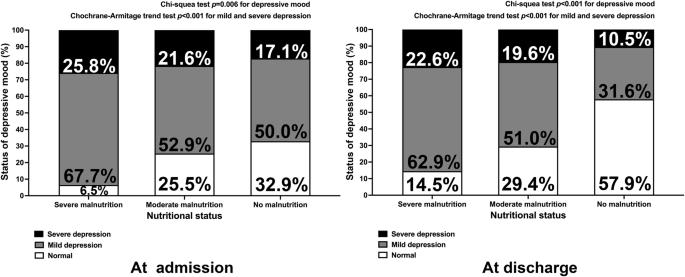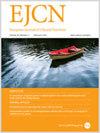Association of GLIM-defined malnutrition with depressive mood in older adults undergoing rehabilitation
IF 3.3
3区 医学
Q2 NUTRITION & DIETETICS
引用次数: 0
Abstract
Depressive mood is prevalent in geriatric patients who undergo rehabilitation. Malnutrition, which frequently coexists in this demographic group, likely affects mental health status significantly. This study examined the association between malnutrition and depressive mood at discharge in geriatric patients who were undergoing rehabilitation and identified the mediating roles of specific malnutrition components in this association. This prospective cohort study comprised 189 geriatric rehabilitation patients. Malnutrition was determined using the Global Leadership Initiative on Malnutrition (GLIM) criteria, and depressive mood was assessed using the Geriatric Depression Scale-15 (GDS-15). The potential mediation of the GLIM components in the relationship between malnutrition and depressive mood was evaluated using causal mediation analysis. Malnutrition was positively associated with increased GDS-15 scores at both admission (p = 0.007) and discharge (p < 0.001). The severity of malnutrition corresponded with increased odds of depressive mood at discharge (moderate malnutrition: odds ratio [OR] 3.84, 95% confidence interval [CI] 1.48–9.94, p = 0.005; severe malnutrition: OR 5.11, 95% CI 1.52–15.17, p = 0.003). Notably, both muscle mass reduction (OR 1.51, 95% CI 1.01–2.27, p = 0.042) and disease burden (OR 1.37, 95% CI 1.00–1.89, p = 0.047) were identified as mediators in the association between malnutrition and depressive mood at discharge. Nutritional status significantly influenced the mental health of geriatric rehabilitation patients, with muscle mass reduction and disease burden mediating this relationship. These findings emphasize the importance of a multidimensional geriatric rehabilitation approach that includes nutritional interventions.

接受康复治疗的老年人营养不良与抑郁情绪的关系。
背景/目的:抑郁情绪在接受康复治疗的老年患者中普遍存在。营养不良在这一人口群体中经常并存,可能会严重影响心理健康状况。本研究考察了正在接受康复治疗的老年患者出院时营养不良与抑郁情绪之间的关系,并确定了特定营养不良成分在这种关系中的中介作用。研究对象/方法:本前瞻性队列研究纳入189例老年康复患者。根据全球营养不良领导倡议(GLIM)标准确定营养不良,使用老年抑郁症量表-15 (GDS-15)评估抑郁情绪。通过因果中介分析,评估GLIM成分在营养不良与抑郁情绪关系中的潜在中介作用。结果:营养不良与老年康复患者入院时GDS-15评分升高(p = 0.007)和出院时GDS-15评分升高(p = 0.007)呈正相关。结论:营养状况显著影响老年康复患者的心理健康,肌肉质量减少和疾病负担在这一关系中起中介作用。这些发现强调了包括营养干预在内的多维老年康复方法的重要性。
本文章由计算机程序翻译,如有差异,请以英文原文为准。
求助全文
约1分钟内获得全文
求助全文
来源期刊
CiteScore
10.60
自引率
2.10%
发文量
189
审稿时长
3-6 weeks
期刊介绍:
The European Journal of Clinical Nutrition (EJCN) is an international, peer-reviewed journal covering all aspects of human and clinical nutrition. The journal welcomes original research, reviews, case reports and brief communications based on clinical, metabolic and epidemiological studies that describe methodologies, mechanisms, associations and benefits of nutritional interventions for clinical disease and health promotion.
Topics of interest include but are not limited to:
Nutrition and Health (including climate and ecological aspects)
Metabolism & Metabolomics
Genomics and personalized strategies in nutrition
Nutrition during the early life cycle
Health issues and nutrition in the elderly
Phenotyping in clinical nutrition
Nutrition in acute and chronic diseases
The double burden of ''malnutrition'': Under-nutrition and Obesity
Prevention of Non Communicable Diseases (NCD)

 求助内容:
求助内容: 应助结果提醒方式:
应助结果提醒方式:


